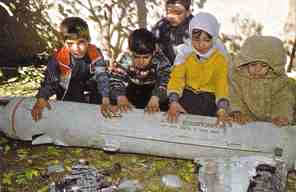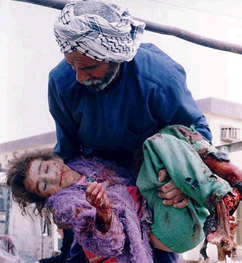

Our
mission is to reduce the number of injuries and deaths due to
injuries,
through prevention, improved trauma care, and improved rehabilitation.
March
15, 2004
Traumatic Injury: The Legacy of the US War in Iraq Part Two: Civilian Injuries and the Impact on Iraqi Children
 While exact
statistics for the number of civilians and children injured during the US war on and occupation of Iraq are difficult to come by with any
certainty, some sources have estimated that for every death there are at least 3 injuries in Iraq. The web site,
Iraq Body Count Project (IBC), keeps a daily running total of deaths related to the war and its aftermath in Iraq. In
2003, the IBC undertook a content-analysis of published press and media reports in order to extract information about injuries and in particular, civilian injuries. The IBC found media and press reports for 107 incidents of civilian injury, with a total number of injuries reported tallying 19, 733. The IBC cautions that this number should not be considered comprehensive, and in all
likelihood is an underestimation of the true magnitude of the problem.
While exact
statistics for the number of civilians and children injured during the US war on and occupation of Iraq are difficult to come by with any
certainty, some sources have estimated that for every death there are at least 3 injuries in Iraq. The web site,
Iraq Body Count Project (IBC), keeps a daily running total of deaths related to the war and its aftermath in Iraq. In
2003, the IBC undertook a content-analysis of published press and media reports in order to extract information about injuries and in particular, civilian injuries. The IBC found media and press reports for 107 incidents of civilian injury, with a total number of injuries reported tallying 19, 733. The IBC cautions that this number should not be considered comprehensive, and in all
likelihood is an underestimation of the true magnitude of the problem.
Injuries
During the War
The Red Cross, reporting from Baghdad during the heaviest fighting of the war,
said that the city's hospitals were so overwhelmed by admissions, it was impossible to maintain accurate counts of the injured. "One major hospital alone had been admitting the war-wounded at a rate of about 100 patients an hour. And in one of the most heart-rending of statistics, another aid organization reported just a month into the war that a hospital, situated in one of the poorest parts of Baghdad, 'had amputated more than 100
limbs of children in that one month.'" (CounterPunch)

Injuries After the War
A UNICEF July 17, 2003 report published after the Iraq Body Count (IBC) content-analysis was conducted, notes that more than 1,000 children have been injured since the end of the war as a result of unexploded ordnances. According to UNICEF, " Iraqi children continue to be maimed and killed at a steady pace by the remnants of war."
( Unexploded Munitions Become Child's
Play) Cluster bombs come in shapes that are attractive to children and many pick up the shiny spherical shapes and are seriously injured. UNICEF also notes that, "in some
neighborhoods small cluster munitions, some shaped like tiny bottles with short ribbons and others that are yellow with tissue parachutes, litter gardens and roof tops. Heavier unexploded bombs are sometimes buried by impact in the floors of houses occupied by families who have nowhere else to live."
In addition, another threat to Iraqi children is the Soviet-era missiles abandoned by Iraqi forces. UNICEF
notes that approximately 100 surface to air missiles (SA-2) are lying around Baghdad in a variety of stages of decay, "some damaged by shrapnel, filled with volatile rocket fuel and with functioning warheads. Many of the missiles and their supporting trailers have been looted for scrap metal, dangerously weakening the superstructures. Some international experts estimate that up to 1,000 SA-2 missiles have been left unguarded across Iraq."
Human Rights Watch, in their report, Human
Rights Watch: Off Target: The Conduct of the War and Civilian Casualties in Iraq
notes that both Iraqi and US-led Coalition forces committed violations and
made decisions that resulted in numerous civilian injuries.
As if all this were not gruesome enough, the situation in Iraq is further
complicated by the limited ability of the US-led coalition forces to provide
medical treatment to Iraqis (for more on this see, Life
and Death in the War Zone: Tug of War, Dave Lounsbury, MD. NOVA)
and medical care in Iraq, as reported by the New York Times, is in a state of chaos. Doctors report that at Baghdad's Central Teaching Hospital for Children, over 80% of patients, when they leave the hospital, have infections that they did not have when they arrived. The war in Iraq has pushed the medical system closer to disaster. "Fighting and sabotage have destroyed crucial infrastructure...'It's definitely worse now than before the war.'"
(NYT)
References
Human
Rights Watch: Off Target:
The Conduct of the War and Civilian Casualties in Iraq
Iraq Body Count Project
(deaths and estimates of injuries)
UnknownNews: Casualties and Injuries in Afghanistan and Iraq (deaths and
estimated "serious injuries")
CounterPunch Exclusive: Adding Indifference to Injury: at least 20,000 civilians injured in Iraq war"
by Hamit Dardagan, John Sloboda and Kay Williams, Aug 7, 2003
Life and
Death in the War Zone: Tug of War, Dave Lounsbury, MD. NOVA
United Nations News Center: Unexploded Munitions Become Child's
Play, July 17, 2003: http://www.un.org/apps/news/infocusnewsiraq1.asp?sID=11
New York Times. "The Struggle for Iraq: Medical Care; Chaos and War Leave Iraq's Hospitals in Ruins" by Jeffrey Gettleman, 2/14/04 (available for a fee in NYT archives)
Other Resources
Iraqi
Children and War (World Vision)
At a Glance: Iraq
(UNICEF)
Crisis Appeal for Iraq's Children (UNICEF)
What
Young People Are Saying About The Conflict in Iraq (UNICEF Voices of Youth)
 |
 |
|---|